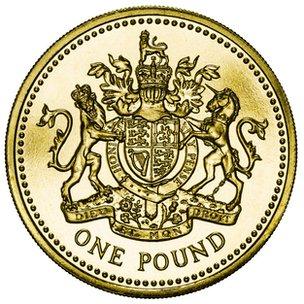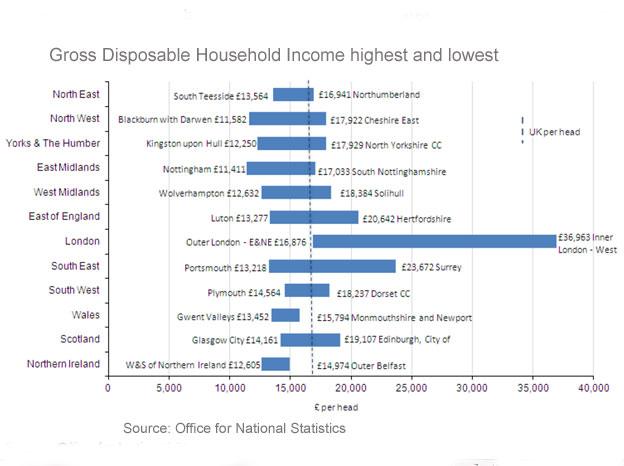Measuring devolution: What impact on the economy?
- Published

Has devolution proved a good deal for the economy in Wales?
Has there been a devolution dividend - to use the buzz phrase from 1999 - where having our own government in Cardiff Bay has made us all better off?
The picture is mixed: Ministers have not shied away from big decisions - gone is the WDA, with economic development now handled in-house by the Welsh government.
But targets to close the GDP gap with England, made in the ambitious early days of devolution, have been abandoned.
West Wales and the Valleys continue to qualify for economic aid from the European Union because of their lowly position in the wealth league table.
Yet unemployment in Wales is 6.8%, the same as the UK average and much lower than the figures for the West Midlands or the North East of England. So is devolved Wales an economic success story after all? And who should get the credit?
Our Economics Correspondent Sarah Dickins has been looking for answers.

What are the influences on the Welsh economy?
Although the Welsh government likes to claim credit for its running of the economy, especially when unemployment has fallen or there is an increase in what we produce, in practice it is only one of several organisations that determine whether the Welsh economy falters or thrives.
The UK government has an important influence especially since it for instance raises taxes and determines welfare payments.
The Bank of England then affects us as it determines monetary policy and sets interest rates.
Then there is the European Union, the World Bank and the International Monetary Fund whose decisions impact on our lives.
And that is all before there is any mention of the impact of changes of policy by multinational corporations around the world.
The Welsh government's policies can soften blows to the Welsh economy and can act to encourage companies to develop and grow but that's a long way from running the economy.

Are we better off in Wales than we were 15 years ago ?
Andrew Sturgess of Abergele Food Bank, said they were seeing increasing numbers of working people
If you take the number of people in work as an indicator of how well off we are, then the answer is yes. Fifteen years ago the rate of unemployment amongst people over 16 years old was 7.2%, one per cent above the UK average. Now it's 6.8%, the same as the average for the UK.
Its Jobs Growth Wales programme, which gives paid work experience for young people, has created more than 13,000 opportunities since it was launched in 2012 and has been extended.
Unemployment in Wales was at its lowest since devolution in the first few months of 2008, before the financial crisis, when it was 5.2% The UK average was low then too, as shown by official statistics., external
Since 2008 Wales has tended to have slightly more unemployment than the UK average until the last six months or so when it has been broadly the same as the average across the UK.
However if you use the other traditional measure of economic strength or weakness, Gross Value Added (GVA, which is like GDP minus taxation) then it suggests Wales has become relatively poorer.
GVA is the value of all the goods and services we produce. It is a good measure of economic activity in a nation or region.
A Welsh government spokesman said: "Since 1999 Wales has outperformed most of the UK in many key economic areas such as creating jobs, increasing disposable income, inward investment and helping companies export. This significant improvement in Welsh economic performance is due to the creation and delivery of innovative Welsh government policies.
"The gap in GVA per head with the rest of the UK has shrunk as we are attracting high quality investment and creating highly skilled jobs. We have protected jobs during the recession and more recently we have helped create thousands of opportunities for young people with programmes like Jobs Growth Wales."


How much are we each producing?
In 1999, each person working in Wales produced on average only 76.9% of the UK average.
In 2011 that rate had fallen to 75.2% . Closer analysis shows that it was at its lowest, at 73.8%, in 2009 but has risen since then.
The latest GVA figures for 2012, published last December, show Wales at the bottom of the nations and regions of the UK but now growing at one of the fastest rates.
South East of England has the largest growth at 2.5%, then the North West Of England 1.7% and Wales closely behind at 1.6%.
It is important to remember that this increase in Wales is from a low base so in London the average person generated £ 37,232 while in Wales it was the lowest value in the UK, £15,401.
Source: Office for National Statistics

So could we do better?
At the fairground - but has Wales been a dragon economy?
Professor Karel Williams, of Manchester Business School, says devolution has been "something of a non-event" in economic terms with Welsh ministers relying on growth from a trickle-down from a booming south east of England.
He believes rather than the issue of powers, Wales has been lacking in imaginative policy ideas and needs to experiment.
"Some risk is justified because the mainstream orthodoxy of the last 30 years isn't working, it's time for a bit of boldness and imagination," he said.

Which are our most disadvantaged and privileged communities?
Paula Owen in Abergele, Conwy, is struggling to find work
It is about more than money. The Index of Multiple Deprivation is the barometer that's used to measure poverty., external It does not look at just how many people are working or how much they earn to spend or save.
It takes into account a wide range of elements that directly affect people like access to services, levels of education, health and housing.
These show the most and least disadvantaged communities in each local authority in Wales.
When all these factors are taken into account West Rhyl is the most deprived community in Wales and Llandaff in Cardiff is the least.

Economically divided UK? Economically divided Wales?
It is widely agreed that there is a growing divide between London and south-east England and the rest of the UK in terms of wealth generation and income.
In Wales, it is very different living in West Rhyl compared with Llandaff on the northern edge of Cardiff.
But recent statistics on Gross Domestic Household Income, external (all incomes minus tax plus benefits like pensions, tax credits or unemployment benefit ) showed Wales to be the least economically divided part of the UK.

The table above shows there is a clear analysis of the highest and lowest rates Gross Disposable Household Income per person. It shows that the gap between the highs and lows in Wales is narrower than any other part of the UK .
The lowest levels in Wales are found in the Gwent Valleys at £13,452 and the highest in Monmouthshire and Newport at £15,794.
In contrast the area with the greatest differences outside London is the south-east of England. In Portsmouth it is £13,218 and in Surrey £23,672. London has the greatest gap with £16,876 in east and north-east London and £36,963 in west London.

Is there a region of England with a similar economic experience as Wales?
Prof Fred Robinson of Durham University on the economic experience of North East England
The North East of England has a very similar economic history and landscape. Its traditional industries of coal, steel and shipbuilding have declined significantly. There has been inward investment, most notably Nissan at Washington.
At one point the development agencies for the North East and Wales were in direct competition. Now neither exists.
The Welsh Development Agency , externalwas taken into the control of the Welsh government in 2006 while One North East was abolished and there is now no regional body responsible for economic development.
The North East has seen its GVA fall from 77.5% of the UK average in 1999 to 75.9% now. That is a greater reduction than Wales but a similar pattern.
But there has been a widening of the gap between unemployment figures - with more people out of work in the North East than in Wales throughout the last 15 years.
Bill Davies of the think-tank IPPR North, external said: "On a per head basis, the Welsh population gets a lot more spent on economic development by the Welsh government than the UK government does in the North East."

Are there other proposals for how the Welsh economy could be run?
Professor Karel Williams is not the only expert who is suggesting Wales should look for alternative solutions.
Recently, research focusing on Tredegar in Blaenau Gwent was published, the Deep Place Study, external. The authors looked in depth at one community and how to lift it out of poverty by 2013. They are confident that the results can be relevant across Wales.
As the gap between continues to widen between Wales and the UK in terms of income and productivity there may well be more voices suggesting a new approach to economic development.